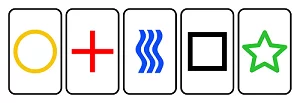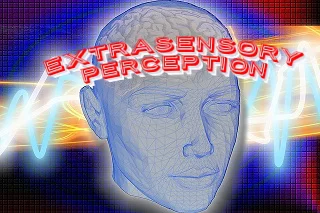Have you ever felt like you knew what someone was going to say before they said it? Did your dreams ever come true? Or have you ever had a vision of something and you have witnessed in reality? Most of us have experienced one or more of these types of events, which is called “ExtraSensory Perception”.
 What is ExtraSensory Perception or ESP?
What is ExtraSensory Perception or ESP?
ESP or Extra Sensory Perception is defined as ability of a person to receive or sense information without the aid of using their five senses – see, hear, smell, touch and taste. According to the Journal of Parapsychology, it is defined as the response to an external event not presented to any known sense. ESP is also called a sixth sense, gut instinct or hunch.
There are many circumstances that occurred during our lives which we may think, that they are just coincidences. Circumstances like, thinking of someone and you have received a phone call from them. Feeling an urge to call someone and you found that person is ill. Thinking of any song or humming a song, and then you turned on a radio to find that same song playing. All these are not coincidences but your ability to sense. Only few people recognize this as a sixth sense and others just ignore it. Those who identify and develop psychic abilities would make their life easy by utilizing ESP. Every one of us has the ability to sense, but some people are highly developed in ESP.
ESP Types:
The main categories which come under ESP (Extrasensory Perception) are:
Telepathy
Ability to send and receive thoughts using mind. It is the most known ability.
Precognition
Ability to see or perceive future events mostly in dreams. Some can sense the future in waking state too.
Clairvoyance
Ability to see events or objects happening somewhere else using an inner sight or mind.
Clairaudience
Ability to hear sounds or words mentally which are not heard by normal ears.
Mediumship
Ability to communicate with spirits of the dead.
Retrocognition
The ability to view past events.
Psychometry
The ability to get the information of an object by just touching it.
Among these, Clairvoyance, Telepathy and Precognition are the most practiced areas. So, here we go in some details with these abilities.
Clairvoyance:
Clairvoyance means “Clear-Seeing” and is derived from French words “Clair” meaning “Clear” and “Voyance” meaning “Vision”. This is the ability of mind to receive information through your third-eye. The person with clairvoyance is known as Clairvoyant. A Clairvoyant can see spirits, symbols and can even read aura of a person.
Clairvoyance is manifested in many ways. Some people see images during waking hours or in dreams. Others receive images when they are performing relaxation exercises or during meditation. Some even can see symbols or numbers when meeting someone. Clairvoyants can even able to find the lost objects or missing persons.
It is also to be noted that all clairvoyants cannot able to predict the image or symbols that they see. It takes practice and time to actually develop this skill to read those pictures.
Telepathy:
Telepathy is derived from two words “Tele” and “Pathos” which means “Distant-Feeling”. It is the ability to receive and send information from one mind to other.
The most common type of telepathy is communication of words from one mind to other. The other types involve emotional telepathy and mass telepathy.
In order to success in mind-to-mind communication, one should have a profound belief that it works. The sender as well as the receiver must believe that telepathy is possible and they both should maintain open minds. There are many exercises that can be practiced between two persons to develop Telepathy.
Precognition:
Precognition is derived from words “Pre” – “before” and “Cognitio” – “acquiring knowledge”. It means ability to see the events before it actually happens.
Precognition is said to be mostly occur in dreams. It is a myth to believe that Precognitive people can know the future very well and can change the situation at will. Though they receive images or messages, the information received is often unclear and so it is unpredictable.
Many experiments were also conducted among the subjects to predict the future order of cards in a shuffled deck and foretell the results of dice throws. But, the statistical support for this was less convincing when compared from experiments done on Telepathy and Clairvoyance.
There is an another phenomenon which is related to ESP, but not a part of it, is Psychokinesis.
|Read: Psychokinesis – Definition & Types
A Brief History of ExtraSensory Perception
How did Extra sensory perception come about? This concept dates back to ancient times many years back, even before renowned researchers carried out experiments in laboratories.
The term “Extrasensory Perception” or “ESP” was first coined by a French Researcher Sir Richard Burton in 1870. In 1892, a French researcher, Dr Paul Joire, used the term ESP to describe some people’s ability who were in a hypnotized state or were in a trance state to sense things without using their ordinary senses.
But the term wasn’t popular until J B Rhine took interest in the subject in 1930’s. J B Rhine (Joseph Banks Rhine) is widely considered to be the “Father of Modern Parapsychology.” Along with his wife Dr Louisa E. Rhine, Dr J B Rhine studied the phenomena now known as parapsychology at Duke University in Durham, North Carolina. J B Rhine popularized the term “Extrasensory Perception” (ESP) to describe the clear ability of some people to acquire information without the use of the known (five) senses. He also adopted the term “parapsychology” to distinguish his interests from mainstream psychology.

The Duke experiments on telepathy, clairvoyance and precognition used specially designed cards called Zener cards (named after their designer, Karl Zener). These cards were composed of decks of 25 cards, with each card having one of the five symbols on one size: a cross, star, wavy lines, circle and square. Zener cards under various experimental conditions, subjects would attempt to guess these cards. Out of each deck of 25 cards, 5 correct guesses were expected by chance. So, the persons who can guess more than what a law of chances would predict, were said to have ESP.
Many scientists and psychologists are skeptical on these experiments and ESP. They say that they do not have proper reasons to believe in ESP and other psychic abilities like Psychokinesis (PK). When psychics challenged these scientists to prove their ESP abilities, they failed in many aspects and they argued that the skeptic people’s negative energy is making them to fail in showing their mind powers.
In the later years, many other parapsychologist have conducted similar experiments and have shown many positive results. They have done experiments by replacing zener cards with other images like paintings and photographs. The experiment goes like this- a “sender” will be shown a particular image, concentrate on it and try to communicate with the “receiver”. The receiver describes what he sees in his mind and the research team records his impressions. After the session completed, the receiver subject attempts to pick the correct one out of a collection of images from his impressions on his mind.
Unfortunately, as further testing progressed, Rhine’s experiments shown a decline in ESP results of a subject, which is referred as a “Decline effect”. It also failed a crucial scientific test of replicability – which means other researchers were unable to duplicate Rhine’s findings with other subjects.
Ganzfeld Experiment
When Parapsychologists had been criticized for the card guessing experiments by skeptics, they had developed a Ganzfeld (German word for “total field”) experiment during early 1970’s.
In a typical ganzfeld experiment, the receiver is placed in a sound proof room relaxing on a comfortable chair. The subject eyes are covered by halved ping-pong balls (so that the visual field was seen as a solid white) and having a red light shining on him or her. The receiver also wears a set of head phones listening to a white noise (White noise is a type of noise that is produced by combining sounds of all different frequencies together) . The receiver is kept in this relaxed state and during this state, the sender observes a randomly chosen target. The sender then concentrates and tries to send the information mentally to the receiver. The receiver is asked to speak out loud describing what he or she can see. This session continues for about 30 minutes.
After the session, the receiver is taken out of the Ganzfeld state and asked to select the target from a set of possible targets. He or she has to select the one which most resembled the image they have witnessed during the session and hit rate is assumed to be 25%.
In another popular experiment, the subjects are asked to influence a machine called Random Number Generator, with their minds. Researchers observed that the subjects do have the ability to influence the machine. Read “Is Psychokinesis Real?” for more information.
Psychological Effects on ESP:
ESP – Hypnosis Link
It is believed that there is a link between a ESP and Hypnosis. In one experiment conducted by Carl Sargent, it was observed that hypnotized persons tend to perform well in ESP compared to non-hypnotized persons. So, this made Sargent to interpret that ESP is associated with a relaxed state of mind.
The Sheep – Goat Effect
Many experiments were conducted in relation to the effect of attitude of subjects to success in ESP scores. The subjects are called as “sheep” who believed in ESP and “goat” who did not. It was observed that “sheep” tend to score above chance levels while “goat” scored below chance levels or “psi-missing”. This effect has been called as “sheep-goat” effect.
Introverts/Extroverts
When experiments done on Extroverts and Introverts, it was found that extroverts scored higher than introverts.
Skepticism
Many experiments were done to prove ESP exists and though it has gained a lot of credibility over the past 100 years, many skeptics still claim that there is an insufficient evidence to support it. They simply cannot accept the validity of the study and claim that research methods have flaws, those studies are fraud and misguided.
Whatever it may be, I believe that one can improve their skills in predicting or sense the things whether it is ESP or not.
Developing ESP or ExtraSensory Perception:
It is believed that every one of us are already having extrasensory perception (ESP) ability as we are born with it. So it is better to say “Developing ESP” instead of “Learning ESP”.
Some simple steps to be followed in order to develop your ExtraSensory Perception
- Belief: The first and foremost thing you must have is “Belief”. You must believe that you can develop ESP and must affirm yourself that this ability is possible. If you do not believe, then it is impossible for you to develop any psychic abilities.
- Meditate: Spend sometime everyday to relax. Sit in a comfortable position and do meditation. You can do any meditation that suits you. You can even listen to Bin-aural Beats that enhance your psychic abilities.
- Read: Read variety of books on psychic abilities and ESP. Internet is the source of vast information where you can get knowledge by reading articles on psychic abilities.
- Meet People: If possible, meet people with similar interests in your area or find groups in your place and join. You can even have this group while meditating.
- Concentration: Try to sense and see every thing that going around you. Be aware of things happening around you. This way, your concentration level will increase and helps to develop your ESP.
- Vibrations: Keep yourself in higher vibrations by thinking always positive and trying to be always happy. Do whatever you like to make you happy without doing any harm to others. Also avoid negative talking.
- Exercise: There are many exercises to do for developing ESP. For example, you can try to predict the card by removing one from a deck of cards. Try to guess who is calling you when you hear your phone ringing, or guessing the person knocking your door, etc. There are many possible ways you can imagine in your daily life for your practice.
- Practice: Practice makes you perfect. Practice different exercises whenever you can. It is better to select one aspect of ESP – Clairvoyance or Telepathy or Precognition, for your practice and later can go further.
- Journal: Keep journal and write your everyday experiences. Tracking your psychic experiences in this way will help you further in developing Extrasensory perception.
- Patience: Developing any psychic ability must require patience, persistence and determination. Never get disappointed if you have some failures initially. Trust yourself and practice till you reach your goal.
Conclusion
ExtraSensory Perception is a subject which is very difficult to prove successfully as it defies the laws of physics. But everything that exists is not scientifically proved. There is still debate going on whether ESP is real or not. Though there is no relevant evidence to prove that ESP exist, there is no evidence to prove that debunks it either. On continuing research, we may hear a good news in the future that ESP is possible.
According to a 2005 Gallup poll, 41% of Americans believe in ESP. This is a decline from surveys done in 2001 that found belief in ESP was 50%.
You can also read a book The Reality of ESP: A Physicist’s Proof of Psychic Abilities
by Russell Targ

 What is ExtraSensory Perception or ESP?
What is ExtraSensory Perception or ESP?
Comments are closed, but trackbacks and pingbacks are open.